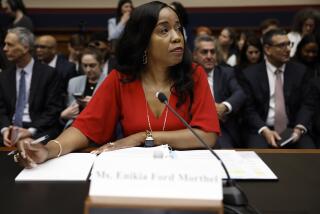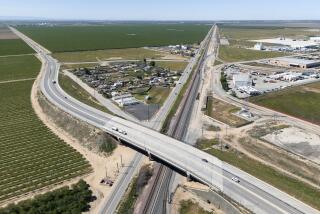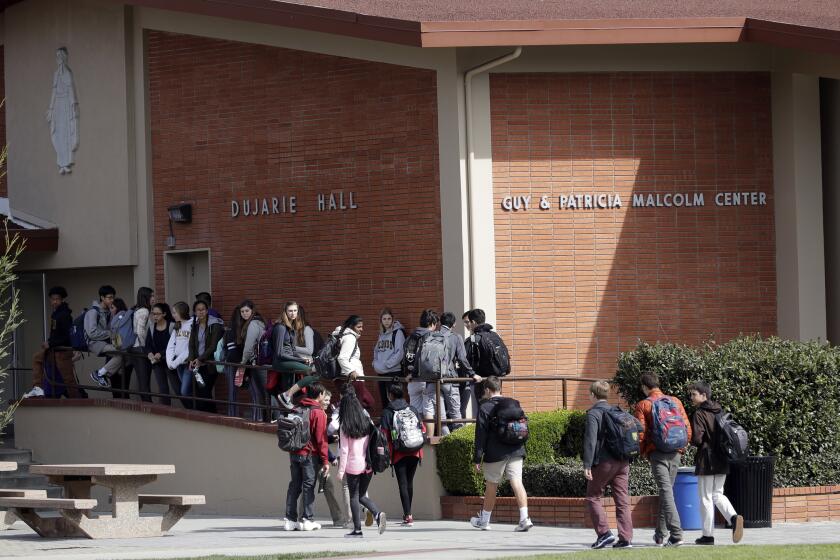After the Vote: Win or Lose, Growth Fight Will Rage : Opposing Sides Disagree on Fallout of Failed Initiative Bid
Both sides in the fight over Measure A say defeat of the slow-growth initiative Tuesday will curtail but not halt efforts to curb Orange County’s rapid growth.
The agreement ends there, however.
Even if the measure is defeated, said Board of Supervisors Chairman Harriett M. Wieder, a candidate for Congress as well as a target of slow-growth activists, “we will work to ensure the integrity of the initiative and implement a safety-net, growth-management plan so that the goals of the initiative will be achieved.”
It’s a pledge that slow-growth leader Tom Rogers finds a little hard to believe.
“The safety-net plan will be flushed down the toilet the morning after the election, unless it’s weakened to the developers’ satisfaction,” he predicted.
Arguing Over Plan
What they’re arguing about is a growth-management plan being written by an 11-member ad-hoc citizens committee chaired by former Supervisor Bruce Nestande, a member of the California Transportation Commission and vice president of Costa Mesa-based Arnel Development Co.
After weeks of meetings, the panel has adopted traffic standards that are virtually the same as those contained in Measure A. Moreover, the committee intends to recommend that supervisors find a new funding source such as a local sales tax to help pay for needed improvements. The slow-growth initiative would create trust funds to finance improvements but leaves to county supervisors the decision of who shall pay into them.
Development industry representatives have agreed to the tough terms of the safety-net plan, but it can be changed at any time by the county’s Planning Commission and Board of Supervisors.
That is what Rogers expects will happen if the initiative loses, along with “immediate acceleration of poorly planned construction projects.”
But, Rogers said, that eventuality would give “added impetus” to the current recall campaigns against Wieder and Supervisor Thomas F. Riley. The recall campaigns were announced after both supervisors voted to approve a controversial development agreement that protects the Irvine Co.’s planned housing project in Laguna Canyon from future changes in county zoning and land-use requirements.
Rogers also foresees a “lowering of the levels of service of all county roads and public services” because of increased construction.
‘A Signal to Build’
The building industry, he said, would see the initiative’s defeat as a “clear signal to build whatever it wants to build, until people won’t buy anymore, and then it will be too late for those of us who already live here.”
John Simon, chairman of Citizens for Traffic Solutions, the main anti-initiative group, strongly disagrees.
“The builders recognize that things will be different from now on,” he said. “There’s going to have to be more growth control than there has been and they know it. Whether the initiative wins or loses, the margin is going to be very narrow. The politicians are going to see that we have divided opinion, and thus no mandate on how to handle it. That will return the decision-making to local government, where it should be.
“There will be no helter-skelter development. We already have managed growth in many respects. We have some of the best planned communities in the world. And the planning will get better.”
Simon said he likes the county’s safety-net, growth-management plan even though its traffic standards are similar to those in the initiative. “It’s worded more clearly than the initiative and has some flexibility,” he said.
John Erskine, executive director of the Building Industry Assn. and mayor of Huntington Beach, said that if the initiative is defeated, the public probably will notice little difference in their lives right away.
More to Read
Start your day right
Sign up for Essential California for news, features and recommendations from the L.A. Times and beyond in your inbox six days a week.
You may occasionally receive promotional content from the Los Angeles Times.






